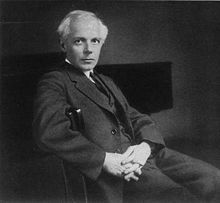“Dido” and “Bluebeard” at LA Opera
YOUR humble blogger came out of a performance of Duke Bluebeard’s Castle yesterday reminded of what a bloody genius Bela Bartok was — and I mean that just about literally. The production at Los Angeles Opera is brutally sharp, filled with sexual menace. The swelling, at times astringent music itself offered a dark kind of beauty to accompany the pain.
What may be most impressive about the performance is that the same stage director — Barrie Kosky, who runs an opera co in Berlin — also offered up a pastel-toned, often-comic reading of Purcell’s Dido and Aeneas. From the sweet colors and lavish gowns of the Purcell to the stark, pitch-black look of the Bartok, here is a director with a contemporary sense of visual style. Overall, it made for a much hipper double-bill than the usual Cav-Pag.
The Bartok hit me harder than the Purcell, but the Irish mezzo-soprano who played Dido, Paula Murrihy, has one of the clearest and most beautiful voices I’ve heard in years.

Bartok 1927
Here’s how Mark Swed begins his review:
Four cautious years after staging Achim Freyer’s cutting-edge but coffer-draining “Ring” cycle, Los Angeles Opera has once more sharpened its edge, and dangerously so. On Saturday night, it mounted a peculiar double bill of Purcell’s delicate “Dido and Aeneas” and Bartók’s indelicate “Bluebeard’s Castle.”
Purcell’s exquisite British Baroque miniature is as gorgeous to behold as anything the company has mounted on the Dorothy Chandler stage. It is lovingly performed. That the humor can be wicked and transgressive only makes the tragedy all the more touching in the end.
Bartók’s expressionist early 20th century drama is the unsettlingly awful opposite. There is nothing nice to look at, just a couple’s pain made plain. The performance is violent. What is here transgressive is that horror also makes a mass murderer somewhat touching in the end as well.
I’ve loved Bartok since I first heard his music, and have a special passion for his string quartets. But I can’t wait to hear Bluebeard again. (For what it’s worth, my wife, who’s been seeing opera for longer than I have, loved them both but preferred Dido.) In any case, see them before they go. Kudos to LA Opera for putting on something this adventurous.
UPDATE: As I think back to Bartok in particular, and the way he’s able to capture such a wide emotional range, using dissonance within an essentially tonal structure, and bring a modern sensibility to music that is still essentially tuneful and accessible: What if Bartok, and not Schoenberg and his serial disciples, had set the terms for 20th century music? How would classical music have sounded different over the decades, and what would its audience be like today?
I welcome reader thoughts on this.
Scott Timberg's Blog
- Scott Timberg's profile
- 7 followers



